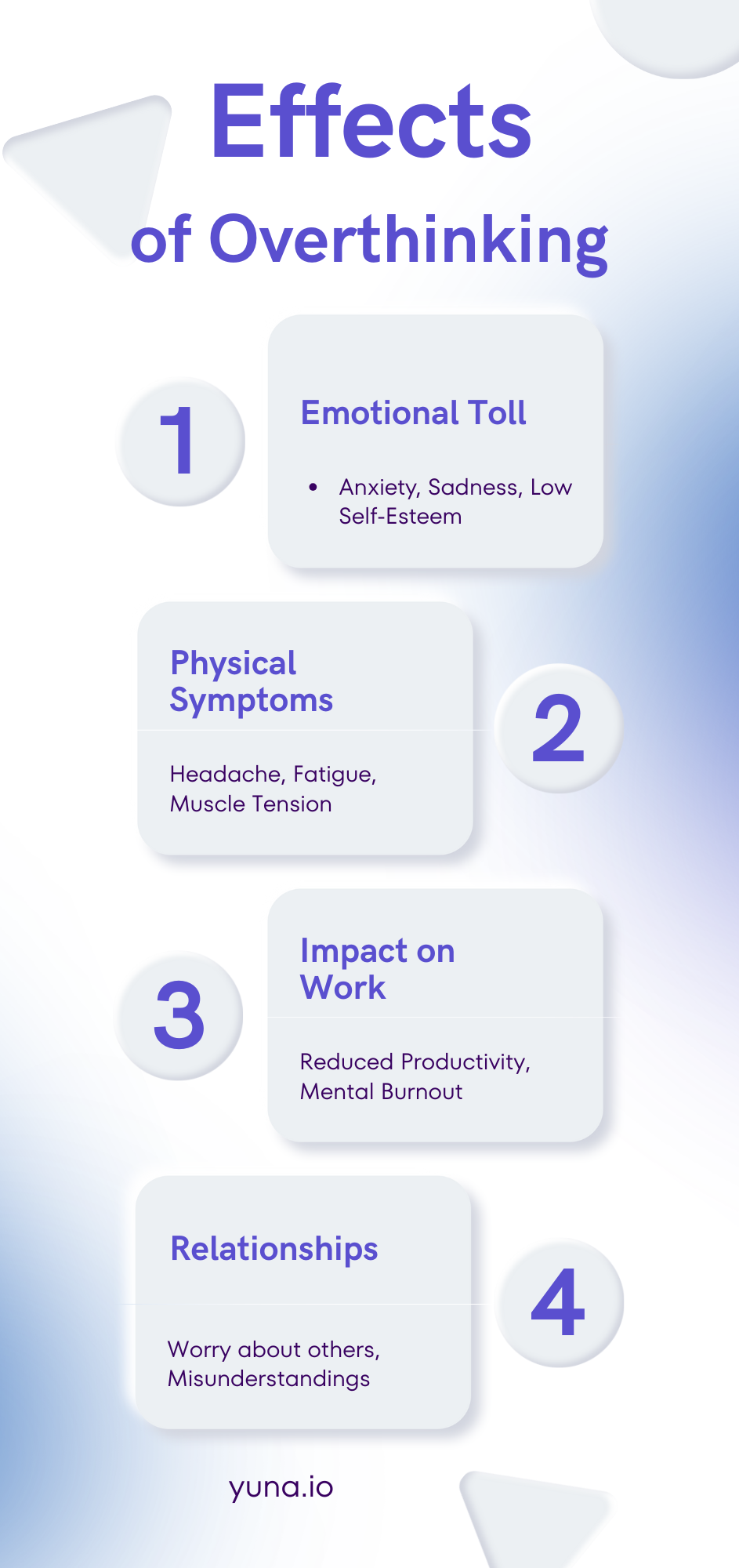You are about to sleep, but your mind won’t stop racing. You replay conversations from the day, analyze what you could have done differently, and worry about what tomorrow may bring. Hours pass, yet you are still stuck in a loop of thoughts you cannot control. This is the reality of overthinking.
Overthinking is more common than most people realize. Studies show that nearly 73% of adults between the ages of 25 and 35 admit to overthinking regularly. It is not simply thinking too much but being trapped in repeated cycles of worry, self-doubt, or regret. Over time, it can impact productivity, strain relationships, and weaken mental health.
While many people associate overthinking with anxiety, it can affect anyone. Whether it is stressing over a decision, dwelling on the past, trying to recover from a breakup, or fearing the future, the effects are draining. The good news is that overthinking can be managed. In this blog, we will break down why people overthink, the toll it takes, and practical strategies to stop the cycle.

What Is Overthinking?
Overthinking is the process of repeatedly analyzing the same situation, decision, relationships, or events without making progress. Unlike healthy problem-solving, which aims at solutions, overthinking keeps the mind stuck in loops of “what ifs” and “should haves.”
It usually shows up in three forms:
- Overanalyzing the past – replaying events and regretting decisions.
- Worrying about the future – imagining endless scenarios of what might go wrong.
- Decision paralysis – being unable to choose because of fear of making the wrong choice.
Normal thinking helps you evaluate choices and learn from experiences. Overthinking, on the other hand, leaves you mentally exhausted without resolution. Psychologists link this cycle to cognitive distortions, where the brain exaggerates threats or mistakes. For example, magnifying a small error at work into a belief that your career is at risk.
Overthinking is also tied to mental health conditions like anxiety and depression. People with anxiety tend to replay negative thoughts, while depression often brings cycles of rumination about the past. However, even without these conditions, anyone can get caught in overthinking loops. Recognizing when regular thought turns into overthinking is the first step to breaking free.

Why Do People Overthink?
Overthinking does not come out of nowhere. It is often triggered by deeper causes that affect how we process experiences.
- Stress: When daily life feels overwhelming, the mind tries to gain control by replaying scenarios.
- Fear of failure: People who fear mistakes often overanalyze decisions in hopes of avoiding the wrong one.
- Perfectionism: Wanting everything to be flawless creates endless second-guessing.
- Trauma or unresolved emotions: Past experiences can trigger worry loops that resurface in similar situations.
- Lack of control: Overthinking can feel like an attempt to prepare for uncertainty.
Psychology research shows that overthinking often comes from the brain’s need for certainty. Cognitive theories describe “worry loops,” where the brain thinks repeated analysis will prevent bad outcomes. In reality, it only reinforces stress.
Perfectionists are especially prone to overthinking. A simple task can take hours because they keep reviewing every detail. Similarly, people with social anxiety may replay conversations to see if they said something wrong. These patterns show how overthinking is not laziness or weakness but a coping mechanism that has gone too far.
Understanding why you overthink can make it easier to challenge the root cause rather than just the thoughts themselves.

Effects of Overthinking on Mental and Physical Health
Overthinking does not just live in the mind. It impacts emotions, physical health, and daily life.
- Emotional toll: Constant worry leads to anxiety, sadness, and low self-esteem. People may feel “stuck” or powerless.
- Physical symptoms: The stress caused by overthinking can result in headaches, muscle tension, fatigue, and insomnia. A study published in the Journal of Psychosomatic Research linked rumination with poor sleep quality.
- Impact on work: Overthinking reduces productivity by delaying decisions and creating mental burnout.
- Relationships: Worrying about what others think or replaying conversations can create distance and misunderstandings.
Research from the University of Michigan found that 52% of overthinkers reported chronic stress symptoms, compared to only 20% of non-overthinkers. The mind-body connection means that cycles of worry are not harmless; they can weaken the immune system and increase the risk of cardiovascular issues over time.
Recognizing these effects is crucial. Overthinking is not just “thinking too much.” It is a mental habit that can harm both personal and professional life if left unaddressed.

Practical Strategies on How to Stop Overthinking
Breaking the cycle of overthinking takes practice. It is not about shutting off your thoughts completely but learning how to redirect them in healthier ways. Small, consistent steps can help you shift from endless rumination to constructive thinking. Below are evidence-based strategies you can use right away.
Challenge Negative Thoughts
One of the main drivers of overthinking is distorted thinking. The brain exaggerates risks or creates false stories that fuel anxiety. To stop this, begin by identifying the thought that keeps repeating. Ask yourself: Is this fact or assumption? Is there another way to see this?
For example, if you are thinking, “I messed up at work, and now my boss will fire me,” pause and reframe. The truth may be, “I made a small mistake, but I corrected it, and mistakes are normal.” By practicing this shift, you weaken the grip of negative thoughts and replace them with balanced ones.
Cognitive behavioral therapy (CBT) often uses this approach to help people challenge unhelpful thinking patterns. Even on your own, you can try writing down the thought and coming up with three alternative, more rational perspectives.
Practice Mindfulness and Meditation
Mindfulness helps ground your thoughts in the present instead of drifting into the past or future. Studies show that meditation can reduce activity in the brain’s “default mode network,” the area linked to overthinking and worry.
You don’t need hours of practice. Simple techniques like focusing on your breath, doing a five-minute body scan, or observing your surroundings without judgment can bring your mind back to now. Apps and guided meditations can also make the practice easier for beginners.
When practiced consistently, mindfulness helps you notice when overthinking starts and gently shift your attention away from it. Over time, it creates more control over how you respond to thoughts.
Limit Time Spent on Decisions
Decision-making is a common trigger for overthinking. To prevent endless loops, set time limits on choices. For smaller decisions, try the “two-minute rule.” If the choice can be made in under two minutes, make it and move on. For larger ones, give yourself a set window, gather key information, and commit to the best available option.
Research shows that striving for “good enough” decisions, known as satisficing, reduces stress compared to always chasing the perfect choice. By limiting decision time, you reduce mental fatigue and free up space for more meaningful tasks.
Journaling for Clarity
Writing down your thoughts helps take them out of your head and onto paper, where they feel more manageable. Journaling allows you to see patterns in your worries and question whether they are realistic.
One helpful method is gratitude journaling, where you list things you are thankful for each day. This shifts focus from negative rumination to positive reflection. Another method is brain dumping before bed, where you write everything on your mind to clear mental space for rest.
Psychologists note that expressive writing can reduce stress and even improve physical health by lowering blood pressure and boosting immunity. Journaling turns vague fears into concrete words, which makes them easier to challenge and resolve.
Physical Activity and Lifestyle Shifts
The mind and body are deeply connected. Exercise is one of the most effective ways to reduce overthinking because it lowers cortisol (the stress hormone) and releases endorphins. Whether it’s walking, yoga, or running, movement helps reset the brain.
A healthy lifestyle also supports clearer thinking. Poor sleep can increase worry cycles, while balanced nutrition stabilizes mood. Even small changes, like limiting caffeine or setting a consistent sleep schedule, can reduce mental loops.
Experts recommend at least 30 minutes of physical activity most days of the week. This does not need to be intense; even light stretching or daily walks make a difference.
Set Boundaries for Mental Space
In today’s digital world, constant notifications and information overload make overthinking worse. Creating boundaries for your mental space is essential. This could mean:
- Taking a digital detox for a few hours each day.
- Scheduling a set “worry time” where you allow yourself 15 minutes to think about concerns, then move on.
- Saying no to commitments that drain your energy or increase stress.
By limiting mental clutter, you create more room for calm and focus. Boundaries signal to your brain that not every thought or request deserves attention.

Long-Term Mindset Shifts to Overcome Overthinking
Quick strategies help in the moment, but lasting change comes from reshaping how you relate to your thoughts. Developing long-term mindset shifts builds resilience and reduces the tendency to spiral into overthinking.
Self-Compassion
One of the most important shifts is self-compassion. Many people overthink because they are harsh critics of themselves. They replay mistakes and set impossible standards. Learning to treat yourself as you would a close friend can ease this pressure. Instead of saying, “I always fail,” try, “I did my best, and I can learn from this.”
Progress Over Perfection
Another shift is progress over perfection. When you focus on improvement rather than flawlessness, you take action without fear of failure. Perfectionism feeds overthinking, while progress encourages momentum.
It also helps to remember that thoughts are not facts. Just because a thought appears does not mean it is true or needs attention. By practicing detachment, you gain freedom from compulsively analyzing every idea.
Professional Support
For those who find overthinking deeply linked with anxiety or depression, therapy and professional support can be life-changing. Cognitive behavioral therapy, acceptance and commitment therapy, and mindfulness-based therapies are all proven to reduce rumination. Speaking with a licensed professional can provide tailored strategies and accountability.
Over time, these mindset shifts create a foundation where thoughts no longer control you. Instead, you learn to observe them with balance and act from clarity.

FAQs
What are the main causes of overthinking?
Overthinking often stems from stress, perfectionism, fear of failure, or unresolved emotions. People also overthink when they seek control over uncertain situations. Psychological research shows that worry loops and cognitive distortions can trap the mind in repetitive patterns.
Can meditation stop overthinking?
Meditation helps reduce overthinking by training the mind to focus on the present. Even short daily sessions, such as mindful breathing or guided meditations, calm mental activity. Over time, consistent practice builds awareness and reduces the brain’s habit of wandering into worry.
Is overthinking linked to anxiety?
Yes. Overthinking is closely connected with anxiety disorders. Constant worry, rumination, and difficulty relaxing are common symptoms. While not everyone who overthinks has anxiety, frequent rumination increases stress levels and can worsen anxiety over time.
How do I stop overthinking at night?
To calm racing thoughts before bed, try journaling, practicing a relaxation routine, or setting aside “worry time” earlier in the day. Reducing screen time before sleep and creating a calming bedtime ritual also make it easier to quiet the mind.
What are quick tips to stop overthinking in the moment?
Take three deep breaths, ground yourself by noticing your surroundings, or write down the thought. Moving your body, calling a friend, or repeating a calming phrase can also interrupt the loop. These quick actions break the momentum of overthinking.

Manage Overthinking with Yuna – Your Online AI Therapist
Overthinking may feel overwhelming, but it is not permanent. By practicing small strategies like mindfulness, journaling, or reframing thoughts, you can begin to quiet your mind. Over time, these changes build healthier thought patterns and reduce mental clutter.
If you are ready to take the next step, Yuna can support your journey. Yuna is an AI-powered online therapist designed to help you manage stress, anxiety, and overthinking in a private and judgment-free space. Through guided conversations, journaling prompts, and personalized techniques, Yuna helps you gain clarity and feel more in control of your thoughts.
Whether you need a quick grounding tool in the middle of the day or long-term guidance for building healthier habits, Yuna is available anytime, anywhere. Overthinking does not have to define your daily life. Start with one small change today, and let Yuna be your coach toward a calmer, more focused mind.










